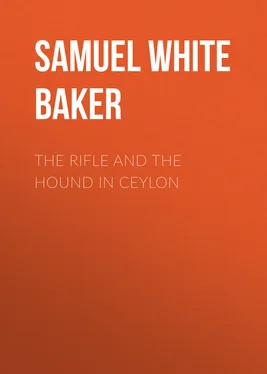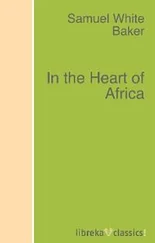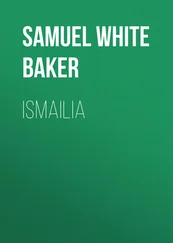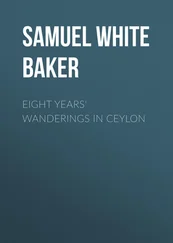Samuel White Baker - The Rifle and the Hound in Ceylon
Здесь есть возможность читать онлайн «Samuel White Baker - The Rifle and the Hound in Ceylon» — ознакомительный отрывок электронной книги совершенно бесплатно, а после прочтения отрывка купить полную версию. В некоторых случаях можно слушать аудио, скачать через торрент в формате fb2 и присутствует краткое содержание. Жанр: Путешествия и география, История, foreign_edu, foreign_antique, foreign_prose, на английском языке. Описание произведения, (предисловие) а так же отзывы посетителей доступны на портале библиотеки ЛибКат.
- Название:The Rifle and the Hound in Ceylon
- Автор:
- Жанр:
- Год:неизвестен
- ISBN:нет данных
- Рейтинг книги:3 / 5. Голосов: 1
-
Избранное:Добавить в избранное
- Отзывы:
-
Ваша оценка:
- 60
- 1
- 2
- 3
- 4
- 5
The Rifle and the Hound in Ceylon: краткое содержание, описание и аннотация
Предлагаем к чтению аннотацию, описание, краткое содержание или предисловие (зависит от того, что написал сам автор книги «The Rifle and the Hound in Ceylon»). Если вы не нашли необходимую информацию о книге — напишите в комментариях, мы постараемся отыскать её.
The Rifle and the Hound in Ceylon — читать онлайн ознакомительный отрывок
Ниже представлен текст книги, разбитый по страницам. Система сохранения места последней прочитанной страницы, позволяет с удобством читать онлайн бесплатно книгу «The Rifle and the Hound in Ceylon», без необходимости каждый раз заново искать на чём Вы остановились. Поставьте закладку, и сможете в любой момент перейти на страницу, на которой закончили чтение.
Интервал:
Закладка:
Speed was our only chance, and again we rushed forward in hot pursuit through the tangled briars, which yielded to our weight, although we were almost stripped of clothes. Another half hour passed, and we had heard no further signs of the game. We stopped to breathe, and we listened attentively for the slightest sound. A sudden crash in the jungle at a great distance assured us that we were once more discovered. The chase seemed hopeless; the heat was most oppressive; and we had been running for the last hour at a killing pace through a most distressing country. Once more, however, we started off, determined to keep up the pursuit as long as daylight would permit. It was now 5 P.M., and we had one hour left before darkness would set in. The wind had entirely ceased, leaving a perfect calm; the air was thick and heavy, and the heat was thus rendered doubly fatiguing. We noticed, however, that the track of the elephants had doubled back instead of continuing in the direct line that we had followed so long. This gave us hope, as the elephants no longer had the advantage of the wind, and we pushed on as fast as we could go.
It was about half an hour before dusk, and our patience and hopes were alike exhausted, when we suddenly once more heard the wh-r-r-r of the elephants winding us within a hundred yards. It was our last chance, and with redoubled speed we rushed after them.
Suddenly we broke from the high jungle in which we had been for the last two hours, and found ourselves in a chena jungle of two years' growth, about five feet high, but so thick and thorny that it resembled one vast blackthorn hedge, through which no man could move except in the track of the retreating elephants.
To my delight, on entering this low jungle, I saw the female at about forty yards' distance, making off at a great pace. I had a light double-barrelled gun in my hand, and, in the hopes of checking her pace, I fired a flying shot at her ear. She had been hunted so long that she was well inclined to fight, and she immediately slackened her speed so much that in a few instants I was at her tail, so close that I could have slapped her. Still she ploughed her way through the thick thorns, and not being able to pass her owing to the barrier of jungle, I could only follow close at her heels and take my chance of a shot. At length, losing all patience, I fired my remaining barrel under her tail, giving it an upward direction in the hope of disabling her spine.
A cloud of smoke hung over me for a second, and, throwing my empty gun on one side, I put my hand behind me for a spare rifle. I felt the welcome barrel pushed into my hand at the same moment that I saw the infuriated head of the elephant with ears cocked charging through the smoke! It was the work of an instant. I had just time to cock the two-ounce rifle and take a steady aim. The next moment we were in a cloud of smoke, but as I fired, I felt certain of her. The smoke cleared from the thick bushes, and she lay dead at SIX FEET from the spot where I stood. The ball was in the centre of her forehead, and B., who had fired over my shoulder so instantaneously with me that I was not aware of it, had placed his ball within three inches of mine. Had she been missed, I should have fired my last shot.
This had been a glorious hunt; many miles had been gone over, but by great luck, when the wind dropped and the elephant altered her course, she had been making a circuit for the very field of korrakan at which we had first found her. We were thus not more than three miles from our resting-place, and the trackers who know every inch of the country, soon brought us to the main road.
The poonchy and the bull elephant, having both separated from the female, escaped.
One great cause of danger in shooting in thick jungles is the obscurity occasioned by the smoke of the first barrel; this cannot escape from the surrounding bushes for some time, and effectually prevents a certain aim with the remaining barrel. In wet weather this is much increased.
For my own part I dislike shooting in thick jungles, and I very seldom do so. It is extremely dangerous, and is like shooting in the dark; you never see the game until you can almost touch it, and the labour and pain of following up elephants through thorny jungle is beyond description.
On our return to the post-holder's hut we dined and prepared for sleep. It was a calm night, and not a sound disturbed the stillness of the air. The tired coolies and servants were fast asleep, the lamp burnt dimly, being scantily fed with oil, and we were in the act of lying down to rest when a frightful scream made us spring to our feet. There was something so unearthly in the yell that we could hardly believe it human. The next moment a figure bounded into the little room that we occupied. It was a black, stark naked. His tongue, half bitten through, protruded from his mouth; his bloodshot eyes, with a ghastly stare, were straining from their sockets, and he stood gazing at us with his arms extended wide apart. Another horrible scream burst from him, and he fell flat upon his back.
The post-holder and a whole crowd of awakened coolies now assembled, and they all at once declared that the man had a devil. The fact is, he had a fit of epilepsy, and his convulsions were terrible. Without moving a limb he flapped here and there like a salmon when just landed. I had nothing with me that would relieve him, and I therefore left him to the hands of the post-holder, who prided himself upon his skill in exorcising devils. All his incantations produced no effect, and the unfortunate patient suddenly sprang to his feet and rushed madly into the thorny jungle. In this we heard him crashing through like a wild beast, and I do not know to this day whether he was ever heard of afterwards.
The Cingalese have a thorough belief in the presence of devils; one sect are actually 'devil-WORSHIPPERS,' but the greater portion of the natives are Bhuddists. Among this nation the missionaries make very slow progress. There is no character to work upon in the Cingalese: they are faithless, cunning, treacherous, and abject cowards; superstitious in the extreme, and yet unbelieving in any one God. A converted Bhuddist will address his prayers to our God if he thinks he can obtain any temporal benefit by so doing, but, if not, he would be just as likely to pray to Bhudda or to the devil.
I once saw a sample of heathen conversion in Ceylon that was enough to dishearten a missionary.
A Roman Catholic chapel had been erected in a wild part of the country by some zealous missionary, who prided himself upon the number of his converts. He left his chapel during a few weeks' absence in some other district, during which time his converts paid their devotion to the Christian altar. They had made a few little additions to the ornaments of the altar, which must have astonished the priest on his return.
There was an image of our Saviour and the **Virgin:** that was all according to custom. But there were also 'three images of Bhudda,' a coloured plaster-of-Paris image of the Queen and Prince Albert upon the altar, and a very questionable penny print in vivid colours hanging over the altar, entitled the 'Stolen Kiss.' So much for the conversion of the heathen in Ceylon. The attempt should only be made in the schools, where the children may be brought up as Christians, but the idea of converting the grown-up heathen is a fallacy.
CHAPTER V
The Four-ounce again—Tidings of a Rogue—Approaching a Tank Rogue—An Exciting Moment—Ruins of Pollanarua—Ancient Ruins—Rogues at Doolana—B. Charged by a Rogue—Planning an Attack—A Check—Narrow Escape—Rogue-stalking—A Bad Rogue—Dangers of Elephant-shooting—The Rhatamahatmeya's Tale.
A broken nipple in my long two-ounce rifle took me to Trincomalee, about seventy miles out of my proposed route. Here I had it punched out and replaced with a new one, which I fortunately had with me. No one who has not experienced the loss can imagine the disgust occasioned by an accident to a favourite rifle in a wild country. A spare nipple and mainspring for each barrel and lock should always be taken on a shooting trip.
Читать дальшеИнтервал:
Закладка:
Похожие книги на «The Rifle and the Hound in Ceylon»
Представляем Вашему вниманию похожие книги на «The Rifle and the Hound in Ceylon» списком для выбора. Мы отобрали схожую по названию и смыслу литературу в надежде предоставить читателям больше вариантов отыскать новые, интересные, ещё непрочитанные произведения.
Обсуждение, отзывы о книге «The Rifle and the Hound in Ceylon» и просто собственные мнения читателей. Оставьте ваши комментарии, напишите, что Вы думаете о произведении, его смысле или главных героях. Укажите что конкретно понравилось, а что нет, и почему Вы так считаете.












